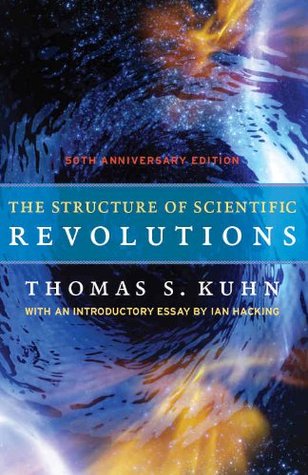More on this book
Community
Kindle Notes & Highlights
Even more important, spending the year in a community composed predominantly of social scientists confronted me with unanticipated problems about the differences between such communities and those of the natural scientists among whom I had been trained. Particularly, I was struck by the number and extent of the overt disagreements between social scientists about the nature of legitimate scientific problems and methods. Both history and acquaintance made me doubt that practitioners of the natural sciences possess firmer or more permanent answers to such questions than their colleagues in social
...more
More important, except in occasional brief asides, I have said nothing about the role of technological advance or of external social, economic, and intellectual conditions in the development of the sciences. One need, however, look no further than Copernicus and the calendar to discover that external conditions may help to transform a mere anomaly into a source of acute crisis.
Who first conceived of energy conservation? Increasingly, a few of them suspect that these are simply the wrong sorts of questions to ask. Perhaps science does not develop by the accumulation of individual discoveries and inventions. Simultaneously, these same historians confront growing difficulties in distinguishing the “scientific” component of past observation and belief from what their predecessors had readily labeled “error” and “superstition.” The more carefully they study, say, Aristotelian dynamics, phlogistic chemistry, or caloric thermodynamics, the more certain they feel that those
...more
Rather than seeking the permanent contributions of an older science to our present vantage, they attempt to display the historical integrity of that science in its own time.
They ask, for example, not about the relation of Galileo’s views to those of modern science, but rather about the relationship between his views and those of his group, i.e., his teachers, contemporaries, and immediate successors in the sciences. Furthermore, they insist upon studying the opinions of that group and other similar ones from the viewpoint—usually very different from that of modern science—that gives those opinions the maximum internal coherence and the closest possible fit to nature.
Instructed to examine electrical or chemical phenomena, the man who is ignorant of these fields but who knows what it is to be scientific may legitimately reach any one of a number of incompatible conclusions.
Observation and experience can and must drastically restrict the range of admissible scientific belief, else there would be no science. But they cannot alone determine a particular body of such belief. An apparently arbitrary element, compounded of personal and historical accident, is always a formative ingredient of the beliefs espoused by a given scientific community at a given time.
Normal science, for example, often suppresses fundamental novelties because they are necessarily subversive of its basic commitments. Nevertheless, so long as those commitments retain an element of the arbitrary, the very nature of normal research ensures that novelty shall not be suppressed for very long.
Sometimes a normal problem, one that ought to be solvable by known rules and procedures, resists the reiterated onslaught of the ablest members of the group within whose competence it falls. On other occasions a piece of equipment designed and constructed for the purpose of normal research fails to perform in the anticipated manner, revealing an anomaly that cannot, despite repeated effort, be aligned with professional expectation. In these and other ways besides, normal science repeatedly goes astray. And when it does—when, that is, the profession can no longer evade anomalies that subvert
...more
The commitments that govern normal science specify not only what sorts of entities the universe does contain, but also, by implication, those that it does not. It follows, though the point will require extended discussion, that a discovery like that of oxygen or X-rays does not simply add one more item to the population of the scientist’s world. Ultimately it has that effect, but not until the professional community has re-evaluated traditional experimental procedures, altered its conception of entities with which it has long been familiar, and, in the process, shifted the network of theory
...more
Their achievement was sufficiently unprecedented to attract an enduring group of adherents away from competing modes of scientific activity. Simultaneously, it was sufficiently open-ended to leave all sorts of problems for the redefined group of practitioners to resolve.


